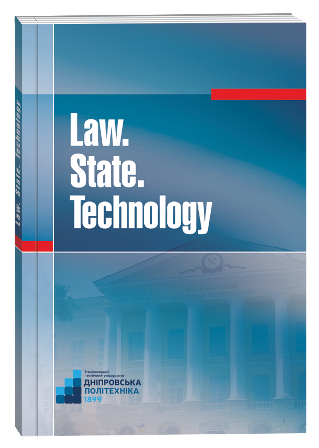EUROPEAN EXPERIENCE OF LEGAL REGULATION OF HAZARDOUS WASTE MANAGEMENT ACTIVITIES
DOI:
https://doi.org/10.32782/LST/2023-1-9Keywords:
pollution, legal regulation, hazardous waste, environmental law, public administration, waste management, waste managementAbstract
The purpose of the article is to establish the normative foundations of state-legal regulation of hazardous waste management activities. It is emphasized that the environmental policy of the European Union should be implemented comprehensively and with all available options and tools, taking into account regional and local differences, as well as ecologically sensitive areas, with an emphasis on: the development of European initiatives to increase the awareness of citizens and local authorities; broad dialogue with interested parties, increasing environmental awareness and public participation; analysis of benefits and costs, taking into account the need to internalize environmental costs; the best available scientific evidence and further improvement of scientific knowledge through research and technological development; data and information about the state and trends of the environment. It was determined that in accordance with the requirements of Directive 2006/12/EC of the European Parliament and the Council of April 5, 2006 on waste, adaptation and harmonization of the national legislation of candidate countries to EU standards is required, where an important emphasis is on guaranteeing waste-free production, as well as developing measures to prevent waste generation and proper management. According to the content of Directive 2008/98/EC of the European Parliament and the Council of April 5, 2006 on waste, it is established that the category "waste" should be understood as any substance or object that the owner discards, or intends to discard, or must get rid of It is established that hazardous waste in accordance with Directive 2008/98/EC of the European Parliament and of the Council of April 5, 2006 on waste means waste that has one or more hazardous properties listed in Annex III, which have such properties as: explosiveness, which is understood to mean certain substances and preparations which can be destroyed by flame or are more sensitive to impact or friction than dinitrobenzene; oxidation as a characteristic of waste containing substances and preparations that exhibit strong exothermic reactions when in contact with other substances. It is concluded that revision is required by the EU legislation on the handling of spent batteries and taking measures to protect the environment and human health by preventing or reducing the adverse impact from the generation and management of electrical waste, and reducing the impact of resource use and improving the efficiency of resource use.
References
Directive 2008/98/EC of the European Parliament and of the Council of 19 November 2008 on waste and repealing certain Directives. URL.: https://eur-lex.europa.eu/legal-content/EN/TXT/?uri=celex%3A32008L0098#ntr4-L_2008312EN.01000301-E0004
Зуєв В.А. Екологічна політика у сфері поводження з відходами в Україні на сучасному етапі. Вісник Академії митної служби України. Сер.: Право. 2014. № 1. С. 93-99.
Зуєв В.А. Організаційно-правові проблеми забезпечення реалізації громадської та виробничої екологічної політики у сфері поводження з відходами. Проблеми законності. 2014. Вип. 125. С. 138-144
Кірін Р.С. Самовільне користування надрами: варіативність суб’єктів та об’єктивної сторони правопорушення. Бюлетень Міністерства юстиції України. 2013. № 7. С. 97-104.
Легеза Ю.О. Здійснення державної екологічної політики в умовах децентралізації державної виконавчої влади. Науковий вісник Ужгород. нац. ун-ту. Серія Право. 2016. № 38. Т. 1. С. 172–176
Легеза Ю. О. Публічне адміністрування у сфері використання техногенних родовищ в Україні. Visegrad journal on human rights. 2015. № 5/2. С. 63–67
Гладій О. В. Суб’єкти публічного управління у сфері регулювання, використання та охорони техногенних родовищ. Право і суспільство. 2017. № 1. С. 140–144
Decision No 1600/2002/EC of the European Parliament and of the Council of 22 July 2002 laying down the Sixth Community Environment Action Programme. URL.: https://eur-lex.europa.eu/legal-content/EN/TXT/?uri=uriserv%3AOJ.L_.2002.242.01.0001.01.ENG&toc=OJ%3AL%3A2002%3A242%3ATOC
Directive 2006/21/EC of the European Parliament and of the Council of 15 March 2006 on the management of waste from extractive industries and amending Directive 2004/35/EC – Statement by the European Parliament, the Council and the Commission. URL.: https://eur-lex.europa.eu/legal-content/EN/TXT/?uri=uriserv%3AOJ.L_.2006.102.01.0015.01.ENG&toc=OJ%3AL%3A2006%3A102%3ATOC
Directive 2008/98/EC of the European Parliament and of the Council of 19 November 2008 on waste and repealing certain Directives (Text with EEA relevance). URL.: https://eur-lex.europa.eu/legal-content/EN/TXT/?uri=celex%3A32008L0098#ntr5-L_2008312EN.01000301-E0005
Directive 2012/19/EU of the European Parliament and of the Council of 4 July 2012 on waste electrical and electronic equipment (WEEE) (recast) Text with EEA relevance. URL.: https://eur-lex.europa.eu/legalcontent/EN/TXT/?uri=CELEX%3A32012L0019&qid=1700232886357
Regulation (EU) 2023/1542 of the European Parliament and of the Council of 12 July 2023 concerning batteries and waste batteries, amending Directive 2008/98/EC and Regulation (EU) 2019/1020 and repealing Directive 2006/66/EC (Text with EEA relevance). URL.: https://eur-lex.europa.eu/legal-content/EN/TXT/?uri=CELEX%3A32023R1542&qid=1700232886357








